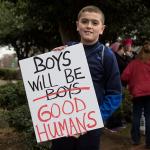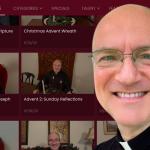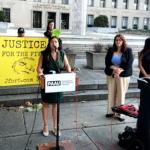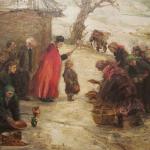Paris, France, Oct 19, 2017 / 06:01 am (CNA/EWTN News).- On Sunday, the people of Austria elected a new government. At 31 years of age, Sebastian Kurz is poised to become Europe's youngest head of government. The Chancellor-to-be of Austria is a Catholic who says of himself that he has a cross hanging in his apartment and that "the faith is very important to me", though he doesn't make it to church as often as he would like to. Kurz won his landslide victory by doing two things. Firstly, emphasising a strong national identity in general, and secondly, taking a harder line on mass immigration in particular – at least by Western European standards. Like it or lump it – and much of the German speaking media is indeed aghast at the outcome – Austria's election result, for all its idiosyncrasies, is part of a broader revolt against the EU and what it stands for. On Oct. 7, a week before Austrians went to the polls, ten intellectuals from eight European nations published a call for "A Europe we can believe in". This "Paris Statement", they declared, purports "to actively recover what is best in our tradition", and to build a "peaceful, hopeful and noble future together". Comprising more than 4,000 words, the manifesto is reminiscent of what the popes have warned Europe about time and again: losing her Christian soul. As Pope Francis put it when addressing the European Parliament Nov. 25, 2014: "In many quarters we encounter a general impression of weariness and aging, of a Europe which is now a ‘grandmother’, no longer fertile and vibrant. As a result, the great ideas which once inspired Europe seem to have lost their attraction, only to be replaced by the bureaucratic technicalities of its institutions." Three years later, this European malaise has broken out in a rash, from the streets of Barcelona to the bureaucracies in Brussels and Berlin, from the shiny offices of London’s City to the beaches of Lampedusa. As the Paris Statement warns, Europe is facing a challenge of epic, indeed, historic proportions, of which the demographic decline, institutional distrust, rise in populism and independence movements, waves of unregulated mass immigration and rising concerns over Islamism are all but symptoms. What is at stake, according to its signatories – which include the Catholic philosophers Robert Spaemann (a friend and advisor to Pope Francis's predecessors), Rémi Brague (a Ratzinger Prize winner), and Ryszard Legutko (a member of the Polish government) – goes deeper: If Europe abandons her Christian roots, rather than drawing on them for renewal, Europe's peoples and cultures will lose their "home". What is meant by "home" – the word used in the German version, Heimat, expresses it more starkly – is not just a place or a roof over your head. It is ontological: A place of being-at-home, of belonging. The opposite is not just homelessness, but annihilation, be it cultural or physical – a point brought home by the plight of Christians in the Middle East. From Oct 9-13, government officials, religious community leaders and non-governmental organisations, including Alliance Defending Freedom (ADF), met in Budapest for an International Consultation on Christian Persecution. ADF Executive Director Paul Coleman said during the conference lead-up: "In the Middle East, ISIS has deliberately targeted Christian communities for destruction. We went to Beirut, Amman and Erbil to meet with Christian refugees from Iraq. We spoke with them, cried with them, prayed with them. We documented their testimonies, and provided this evidence to those in power. Successive governments and recently even the United Nations are recognising that ISIS is committing genocide." Addressing the 300 participants from 30 nations, Hungary's head of government, Prime Minister Viktor Orbán, said that while the “intellectual discrimination” against Christians in Europe is “painful but tolerable,” the physical suffering endured by those in Africa and the Middle East is being ignored by an “apathetic Europe” that “denies its Christian roots.” “A group of Europe’s intellectual and political leaders want to create a mixed society that would completely change the continent’s cultural and ethnic identity, and Christian nature, within just a few generations,” Orbán said. “Hungary, however, is doing the opposite of what Europe is currently doing.” British intellectual Sir Roger Scruton, one of the signatories of the Paris Statement, agrees with this stance. "Poland and Hungary are on the right track. You only have to see the dogmatism and cruelty of the Islamic revival in Africa and the Middle East to recognize how threatened we are", the philosopher told CNA in an email interview. Even critics of the Paris Statement agree that there are valid reasons for this existential angst for Europe. If anything, they scold the scholars for not being clearer about it. “What is Europe?” Matthew Walther asks in "The Week”, and then continues: “For me Hilaire Belloc put it best: ‘Europe is the faith, and the faith is Europe’” – and, laconically, Walther adds: “He should have said ‘was’." Not everyone is as pessimistic – least of all the popes. In the early 2000s, Saint John Paul II eloquently, albeit unsuccessfully, appealed for the European Union’s constitution to mention Europe’s Christian roots. Undeterred, the then-Prefect of the Congregation of the Doctrine of the Faith, Cardinal Joseph Ratzinger, continued the struggle. In a 2004 interview with Le Figaro magazine, Cardinal Ratzinger judged the EU’s decision to avoid any mention of God a mistake. As Pope Benedict XVI, he then used the occasion of his very first general audience in 2005 to point out "the inalienable Christian roots of [Europe’s] culture and civilisation”. Later that year, visiting Cologne for World Youth Day, he urged one million people attending mass there to recover their Christian roots. Time and again, he emphasised that the future of Christianity is a bright one in Europe – albeit only in the long term. For now, Europe is at a crossroads; and the actual role of the Church in helping the continent rediscover its Christian soul is clear, at least to Roger Scruton. "The Catholic Church should do what it is called to do, namely preach the gospel and defend the faith", he told CNA. Read more















